90% of our body’s serotonin, otherwise known as the ‘happy hormone’, is produced in our gut (1)- so it is no wonder that what we eat affects our mental health (2). Although other factors can also play an important role, changing your food is something you can control to improve your wellbeing.
Following are 8 nutritious mood-boosting foods, all of which are incorporated in the Reset Your Health plan, which will help heal your gut and give you that well deserved pick-me-up!
The brain boosting powers of fish
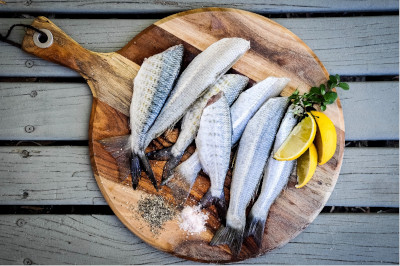
Not only is fish packed with protein, but it contains all important omega 3 fatty acids. Although fat is traditionally seen as bad for your health, it is also vital. After all, your brain is made up of 60% fat! (3)
A frequent helping of fish can provide nutrients for the brain, as well as reducing inflammation which relieves symptoms of depression. (4)
The healing properties of fruits and vegetables
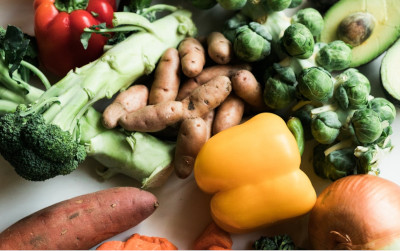
Everyone knows that fruit and vegetables are good for your gut, but they are also mood-boosting foods!
In fact, one recent study found that eating vegetables makes you just as happy as after you eat sweets! (5)
This mood-lifting effect is due to the high levels of nutrients in fruits and vegetables, such as polyphenols and folic acid (4). Polyphenols have antioxidant and anti-inflammatory properties which can reduce symptoms of depression and improve brain health (6). Folic acid is needed to make serotonin, so eating lots of leafy greens, can help to improve your mood. (7)
A surprising mood-boosting food – dark chocolate!

You might not expect dark chocolate to make it onto this list! However, cacao, present in large quantities in dark chocolate, contains the uncommon tryptophan protein. This is a precursor to serotonin so is required to make the all-important ‘happy hormone’. (8)
Of course, everything in excess is bad for you, and some research debates about whether chocolate contains enough feel-good compounds to cause a psychological response. (9)
Regardless, cacao contains high levels of flavonoid compounds. These chemicals help to increase blood flow to the brain and are also an antioxidant and anti-inflammatory, and thus improves brain health and heals your gut. (10)
Find out more about the health benefits of chocolate by reading this blog.
The fermented foods good for your gut
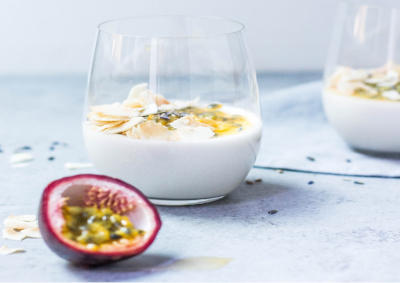
Fermented foods such as kefir, sauerkraut and kimchi are also mood-boosting foods through their role as probiotics. This means they contain lots of bacteria that are good for the gut.
Early research suggests that this is because a healthy microbiome can increase the production of tryptophan, an amino acid needed to form serotonin. (11) This consequent increase in serotonin can then help alleviate symptoms of depression.
In fact, fermented foods have been part of the human diet for hundreds of thousands of years and they remain part of the dietary practices of most known traditional diets today! (3)
The gut healing powers of turmeric
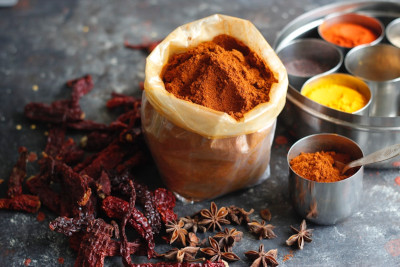
Turmeric has long been used as a healing spice- there is evidence of its use from 1900BC! This is because not only does it have antioxidant and anti-inflammatory properties, but it can also be used for its antiviral and antifungal abilities. These characteristics are due to the presence of the chemical curcumin, which is responsible for turmeric’s bright yellow colour. (12)
Although not yet fully understood, turmeric is thought to alleviate your mood through its anti-inflammatory effects, and by increasing the levels of neurotransmitters, such as serotonin and dopamine, in the body. This provides a natural anti-depressant effect. (13)
The nutritional value of nuts

Nuts can be a great source of nutrition as well as giving you a pick-me-up. They contain not only omega-3 fatty acids (the ‘good’ fats), but also high levels of tryptophan which lead to a higher production of serotonin. (14)
In particular, walnuts seem to have added benefits for your mental health due to their high flavanol content. This helps to increase your cognition as well as further reducing depression scores, recent studies have shown (15).
The powerful properties of whole grains
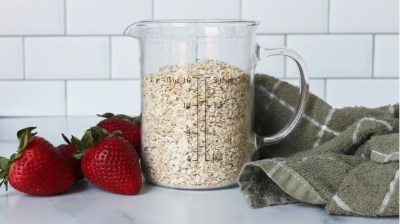
Whole grains, such as oats and brown rice, help to keep your gut healthy and happy through being an excellent source of dietary fibre. (16)
Fibre feeds all the good bacteria found in your microbiome, making it a prebiotic. This helps to keep production of serotonin, and other important neurotransmitters, running smoothly. (17)
Furthermore, these complex carbohydrates cause a slow release in energy, making your blood sugar levels more stable. Massive fluctuations in blood sugar levels can lead to mood swings and irritability. This means that eating lots of sugary foods doesn’t boost your mood in the long term- it will just cause a short term high and then a low! (16)
The healing potential of olive oil

Olive oil contains omega 3 fatty acids, as well as unsaturated fats, which can help to boost your mood by maintaining your nerve and brain health. This allows nerve cells (neurons) to effectively communicate with one another, helping to prevent symptoms of depression. These fatty acids also increase the levels of serotonin in your body, leading to an elevation in mood. (18)
Olive oil is also one of the key components of the Mediterranean diet, along with nuts, fruits and vegetables and occasional red meat and wine. One study found that following a Mediterranean or Japanese diet (which contains lots of fish and fermented foods) leads to a 25%-35% decrease in depressive symptoms compared to a Western diet. (19)
To learn more about the benefits of the Mediterranean diet, read our blog post.
This must seem like a lot to keep on top of, in order to keep happy and healthy! Why don’t you try the Reset your Health plan instead? All these mood-boosting foods are already incorporated in the dozens of different recipes, tailored to your food preferences- taking the stress out of healthy living!
References
- NHS Mental health. (2020). Accessed online 09/12/20, from https://www.england.nhs.uk/mental-health/
- About food and mood. (2017). Accessed online 09/12/20, from https://www.mind.org.uk/information-support/tips-for-everyday-living/food-and-mood/about-food-and-mood/
- Lachance, L., & Ramsey, D. (2015). Food, mood, and brain health: Implications for the modern clinician. Accessed online 09/12/20, from https://www.ncbi.nlm.nih.gov/pmc/articles/PMC6170050/
- Huang, Q., Liu, H., Suzuki, K., Ma, S., & Liu, C. (2019, September 5). Linking What We Eat to Our Mood: A Review of Diet, Dietary Antioxidants, and Depression. Accessed online 09/12/20, from https://www.ncbi.nlm.nih.gov/pmc/articles/PMC6769512/
- Wahl, D., Villinger, K., König, L., Ziesemer, K., Schupp, H., & Renner, B. (2017, December 06). Healthy food choices are happy food choices: Evidence from a real-life sample using smartphone-based assessments. Accessed online 09/12/20, from https://www.nature.com/articles/s41598-017-17262-9
- C, Y. (2018, November 2). The Immunomodulatory and Anti-Inflammatory Role of Polyphenols. Accessed online 09/12/20, from https://pubmed.ncbi.nlm.nih.gov/30400131/
- Young, S. (2007, March). Folate and depression–a neglected problem. Accessed online 09/12/20, from https://www.ncbi.nlm.nih.gov/pmc/articles/PMC1810582/
- Nehlig, A. (2013, March). The neuroprotective effects of cocoa flavanol and its influence on cognitive performance. Accessed online 09/12/20, from https://www.ncbi.nlm.nih.gov/pmc/articles/PMC3575938/
- Katz, D., Doughty, K., & Ali, A. (2011, November 15). Cocoa and chocolate in human health and disease. Accessed online 09/12/20, from https://www.ncbi.nlm.nih.gov/pmc/articles/PMC4696435/
- Chang SC;Cassidy A;Willett WC;Rimm EB;O’Reilly EJ;Okereke OI;. (2016). Dietary flavonoid intake and risk of incident depression in midlife and older women. Accessed online 09/12/20, from https://pubmed.ncbi.nlm.nih.gov/27413131/
- Wallace, C., & Milev, R. (2017, February 20). The effects of probiotics on depressive symptoms in humans: A systematic review. Accessed online 09/12/20, from https://www.ncbi.nlm.nih.gov/pmc/articles/PMC5319175/
- Gomez-Pinilla, F., & Nguyen, T. (2012, May). Natural mood foods: The actions of polyphenols against psychiatric and cognitive disorders. Accessed online 09/12/20, from https://www.ncbi.nlm.nih.gov/pmc/articles/PMC3355196/
- Kulkarni, S., & Dhir, A. (2010, March). An overview of curcumin in neurological disorders. Accessed online 09/12/20, from https://www.ncbi.nlm.nih.gov/pmc/articles/PMC2929771/
- Hulsken, S. Märtin, A., Mohajeri, M., & Homberg, J. (2013). Food-derived serotonergic modulators: Effects on mood and cognition. Nutrition Research Reviews, 26(2), 223-234. Doi:10.1017/S09544224130000164
- Arab L, Guo R, Elashoff D. Lower Depression Scores among Walnut Consumers in NHANES. Nutrients. 2019;11(2):275. Published 2019 Jan 26. doi:10.3390/nu11020275
- P NPV, Joye IJ. Dietary Fibre from Whole Grains and Their Benefits on Metabolic Health. Nutrients. 2020;12(10):3045. Published 2020 Oct 5. doi:10.3390/nu12103045
- Li H, Wang P, Huang L, Li P, Zhang D. Effects of regulating gut microbiota on the serotonin metabolism in the chronic unpredictable mild stress rat model. Neurogastroenterol Motil. 2019;31(10):e13677. doi:10.1111/nmo.13677
- Perveen T, Hashmi BM, Haider S, Tabassum S, Saleem S, Siddiqui MA. Role of monoaminergic system in the etiology of olive oil induced antidepressant and anxiolytic effects in rats. ISRN Pharmacol. 2013;2013:615685. Published 2013 Jul 10. doi:10.1155/2013/615685
- MD, E. (2020, March 31). Nutritional psychiatry: Your brain on food. Accessed online December 09, 2020, from https://www.health.harvard.edu/blog/nutritional-psychiatry-your-brain-on-food-201511168626
